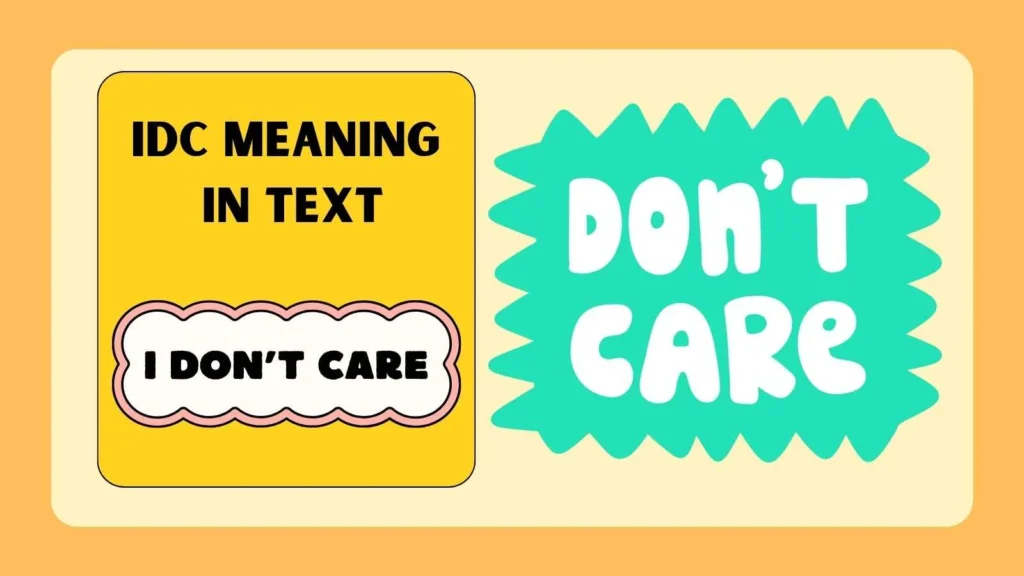If you’ve ever been scrolling through messages and saw someone type IDC, you probably paused for a second and thought: What does that even mean? In today’s fast-paced digital world, abbreviations like IDC save time but can also leave people confused.
That’s why so many search for its meaning—it helps them decode conversations, understand emotions, and avoid misunderstandings. Whether you’re chatting with friends, reading comments online, or swiping on a dating app, IDC pops up more often than you think.
Understanding it isn’t just about learning internet slang—it’s about catching the tone behind the words. In this article, we’ll break down IDC meaning in text, explore where it came from, when to use it, and how to reply when someone drops it in a conversation.
By the end, you’ll not only know what it means but also how to use it like a pro.
Definition & Meaning
The abbreviation IDC stands for “I don’t care.” It’s one of the most common shorthand expressions in texting and social media. People use it to express disinterest, dismissiveness, or simply to signal that something doesn’t matter to them.
- Example: “What do you want for dinner?” — “IDC, anything’s fine.”
- Example: “Did you hear about that drama?” — “IDC, it’s not important to me.”
Tone is everything here. Sometimes, IDC is harmless and casual. Other times, it can feel cold or even rude, depending on context.
Background & History
IDC started as part of early internet chatroom culture in the late 1990s and early 2000s. When SMS texting charged per character, abbreviations like IDC, LOL, and BRB helped people save space and time.
Over the years, IDC has remained popular across generations, showing its adaptability. Unlike some short-lived acronyms, IDC has survived the shift from old-school texting to modern social media platforms like Instagram, TikTok, and Twitter.
Usage in Various Contexts
People use IDC differently depending on the situation:
- Casual Chats – Friends often use it to sound laid-back.
- Arguments – It can signal frustration or dismissal.
- Dating Apps – Sometimes typed to appear “chill” or “unbothered.”
- Workplace Chats – Rarely appropriate, unless the context is very casual.
- Social Media Posts – Used in captions or comments to project a carefree attitude.
Common Misconceptions & Clarifications
- It doesn’t always mean rude: IDC can simply mean “I have no preference.”
- It’s not always negative: Tone and emojis can soften the meaning. (IDC 🙂 sounds nicer than IDC 🙄).
- Not the same as indifference: Sometimes IDC is exaggerated, not literal.
Similar Terms & Alternatives
People often use different abbreviations that carry a similar meaning to IDC:
- IDGAF – Stronger, harsher version (“I don’t give a f***”).
- IDRC – Short for “I don’t really care.”
- Meh – Informal way of showing indifference.
- Whatever – More casual but can still sound dismissive.
How to Respond to This Term
When someone says IDC, your response depends on the situation:
- If casual: “Cool, I’ll pick then.”
- If dismissive: “You sure? It sounds like you do care.”
- If playful: “IDC either, guess we’re both chill.”
Regional or Cultural Differences
The phrase IDC is widely understood in English-speaking countries, but:
- In the US, it’s common in both texting and memes.
- In the UK, some people prefer “not fussed” or “couldn’t care less.”
- Non-native English speakers may interpret IDC more literally, missing the nuance of tone.
Comparison with Similar Terms
- IDC vs. IDGAF: IDC is lighter, while IDGAF is harsher.
- IDC vs. Meh: “Meh” expresses boredom; IDC shows disinterest.
- IDC vs. Whatever: “Whatever” can imply annoyance, IDC is shorter and sharper.
Usage in Online Communities & Dating Apps
On Reddit, TikTok, and Twitter, IDC is used as a quick clapback or to show detachment. On dating apps, it often appears in bios to suggest someone is “easy-going” (“IDC what we do as long as we vibe”). However, too much IDC in a chat can make you seem uninterested.
Hidden or Offensive Meanings
While IDC itself is not offensive, its tone can come across as:
- Dismissive – making others feel unimportant.
- Passive-aggressive – depending on punctuation or emoji use.
- Cold – when used in serious conversations.
Suitability for Professional Communication
Using IDC in professional settings is risky. In casual workplace chats with close colleagues, it might be fine. But in emails, client messages, or team discussions, it comes across as unprofessional. Instead, use polite alternatives like:
- “I have no preference.”
- “I’m okay with either option.”
- “I’m flexible.”
FAQs
What does IDC stand for?
It means “I don’t care.”
Is IDC rude?
Not always—it depends on tone and context.
Can I use IDC at work?
Avoid it in professional settings; use polite alternatives instead.
What’s the difference between IDC and IDGAF?
IDC is mild; IDGAF is harsher and often offensive.
Do people use IDC on dating apps?
Yes, often to show they’re easy-going or flexible.
How do I reply when someone says IDC?
Acknowledge it and make the choice, or ask for clarification if it feels dismissive.
Conclusion
The phrase IDC meaning in text is simple on the surface—it stands for “I don’t care.” But like most slang, the meaning shifts with context, tone, and even emojis. Whether it’s casual, playful, or dismissive, IDC continues to be a staple in digital communication.
Understanding when and how to use it can help you avoid misunderstandings and keep your conversations clear. Use it wisely, especially outside personal chats, and you’ll always stay on top of modern slang.
